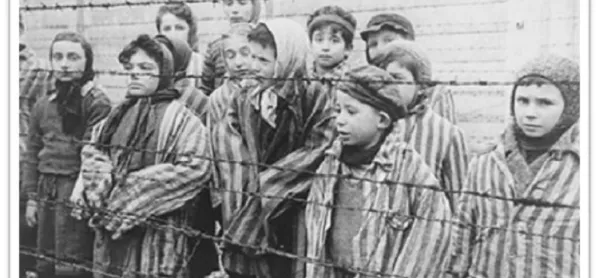- Home
- The power of witness testimony in Holocaust education
The power of witness testimony in Holocaust education

January brings with it a time for all of us in education to reflect on one of the darkest periods of human history. Holocaust Memorial Day (on Monday, 27 January, this year) in many schools will often entail additional lessons, assemblies and activities in an attempt to ensure that our students gain an insight into the atrocities committed between 1933 and 1945 in Europe, and us teachers are always looking for new ways to get this message across in a manner that is inspiring, engaging and respectful.
For two years now the students of Arena Academy, an 11-16 secondary in Birmingham, have been involved in an innovative project based on the gifted video testimony of a survivor of the Holocaust. This gift was shared with us by Echo Eternal, a project led by CORE Education Trust and championed by our CEO Adrian Packer.
I took up the project as lead for our school nine months ago and what I found was breathtaking. Echo Eternal has found a medium to engage students with the Holocaust in a unique and inspiring way, through first-hand testimony of survivors. Each school that takes part is given an “echo”, the testimony of someone who was there, who experienced the Holocaust, someone who survived. It is these testimonies, which always resonate, that form the backbone of the project.
All too often it is easy for students to read quotes from textbooks and find it hard to connect; they feel that an event is simply something that happened to somebody else from a different time. By linking students and survivors through these testimonies, and in some instances being able to actually contact or meet the survivor in person, our young people are able to make a connection with the Holocaust that would otherwise not be available to them.
Holocaust Memorial Day: Survivors’ testimonies
The testimony becomes the inspiration for a piece of artistic expression. Students work with an artist in residence at school to explore themes of the Holocaust and its impact on people. Many of the students that take part would never describe themselves as artistic or dramatic, yet their total immersion with the project is evidence of the power of the testimony and of the power of Echo Eternal itself. This culminates in a dramatic performance in school and finally a permanent recording on film to be shared with our wider community, through events like exhibitions and live performances.
It is not only the students that benefit from this project, it is teachers, too. Art has featured heavily for us this year, including a successful entry in the Holocaust Memorial Day Trust’s #75MemorialFlames national exhibition. The project has had a profound impact on our art teacher, Holly, who after working with the children on this project is now planning a trip to Auschwitz with members of her family.
Whilst the key focus of Echo Eternal is the Holocaust, it also has the broader aim of genocide awareness. This year has seen Arena Academy focus on a more recent human tragedy, the genocide against the Tutsi in Rwanda. The students’ most recent “echo” is a response to Eric Eugene Murangwa MBE, a survivor of the genocide. It is not easy to approach this subject matter, particularly with younger children, and still accurately convey the horror contained within each testimony. Because of time constraints, history teaching often tends to emphasise the broader picture of events, but Echo Eternal gives students a vantage point that many other aspects of history teaching cannot. This is history through the eyes of the survivor and the sense of empathy that this invokes in young people creates a lasting impact. They will remember Eric and his story for years to come.
The significance of projects such as Echo Eternal cannot be underestimated. Earlier today, I saw a clip on social media from the United States, filmed just last weekend, of a well-spoken young man explaining why he knew the Holocaust did not happen. Anti-Semitic attacks have increased in the UK for the past three years, with a reported 892 incidents between January and June of 2019 alone. In an age of wilful misinformation, disinformation and agenda-driven revisionism, ensuring that young people have the opportunity to learn about these atrocities from the survivors themselves takes on an added resonance.
Darren Hart is a history teacher and director of student opportunities at Arena Academy in Birmingham, part of CORE Education Trust
Echo Eternal is a commemorative arts, media and civic engagement project, which has seen 14 schools gifted one of the 112 UK Holocaust survivors’ stories filmed by Natasha Kaplinsky for the UK Holocaust Memorial Foundation. After the launch of the project in Birmingham on Holocaust Memorial Day in January 2018, schools have worked with artists to create “echoes” to ensure that these stories are forever remembered. From 2021 the project will be extended to other regions of the UK, culminating in an exhibition in the Learning Centre that will accompany the new national Holocaust Memorial next to the Houses of Parliament. By 2022, it is expected that around 15,000 children, young people and their families will have been part of this movement
Keep reading for just £1 per month
You've reached your limit of free articles this month. Subscribe for £1 per month for three months and get:
- Unlimited access to all Tes magazine content
- Exclusive subscriber-only stories
- Award-winning email newsletters